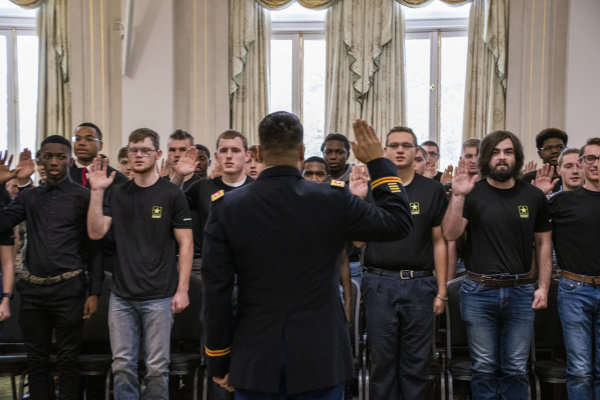

New Army recruits will take a personality test to see if certain traits they have could make them a good fit for military occupational specialties they may not have been originally eligible for because of low qualification test scores.
The Tailored Adaptive Personality Assessment System (TAPAS), the new 120-question military entrance exam, will be administered as part of a three-year pilot study to determine if the Army can have recruits successfully placed in jobs that may require “slightly higher” test scores than what they received on the Armed Forces Qualification Test (AFQT), according to an Army press release says.
The exam aims to “predict performance, behaviors, attitude, and attrition of potential soldiers.”
TAPAS has been given to recruits alongside other entrance exams since 2009, per the press release, though it was previously used to collect data on soldiers who had already entered their military occupational specialities.
TAPAS can unlock “motivational aspects of soldiers’ performance, like whether or not they’re a good fit for Army life, if they are an attrition risk, if they have leadership potential, resilience, team orientation, ingenuity, selflessness, commitment to serve, and even how well they’re likely to perform on an Army physical fitness test,” Dr. Heather Wolters, a senior research psychologist at the Army Research Institute for the Behavioral and Social Sciences’ Personnel Assessment Research Unit, said in 2015.
Data over the years has shown researchers that “individuals with higher motivation outperform what their below-average score indicates.” In other words, a soldier could test below-average on the AFQT but perform at a higher level because they show promise in their TAPAS score.
In the pilot program, recruits who score between a 45-49 on the AFQT but who also score in the top 50% on the TAPAS test will “be exempt from the AFQT grading scale,” per the press release.
Tonia Heffner, the selection and assignment research unit chief at the Army Research Institute for the Behavioral and Social Sciences, said in the release that soldiers may score “just below” on the AFQT, “but because of their motivation, they’ll behave like someone who scores above.”
Heffner said that soldiers whose TAPAS scores show higher motivation typically adapt better to the service and have fewer disciplinary incidents.
“Those who enlist through the pilot program will be more qualified than what their cognitive test score says,” Heffner said in the release. “I expect them to perform much higher than that. It’s not even a little bit, it’s noticeably higher than that. There will be lower attrition for the people in the pilot program and they will outperform many of their peers.”
Heffner stressed that this won’t result in lower standards for new soldiers — they’ll still be held to the other regular screening standards. Instead, TAPAS testing will bring the Army “high-quality, extremely-fit individuals who are capable of performing successfully as soldiers.”
